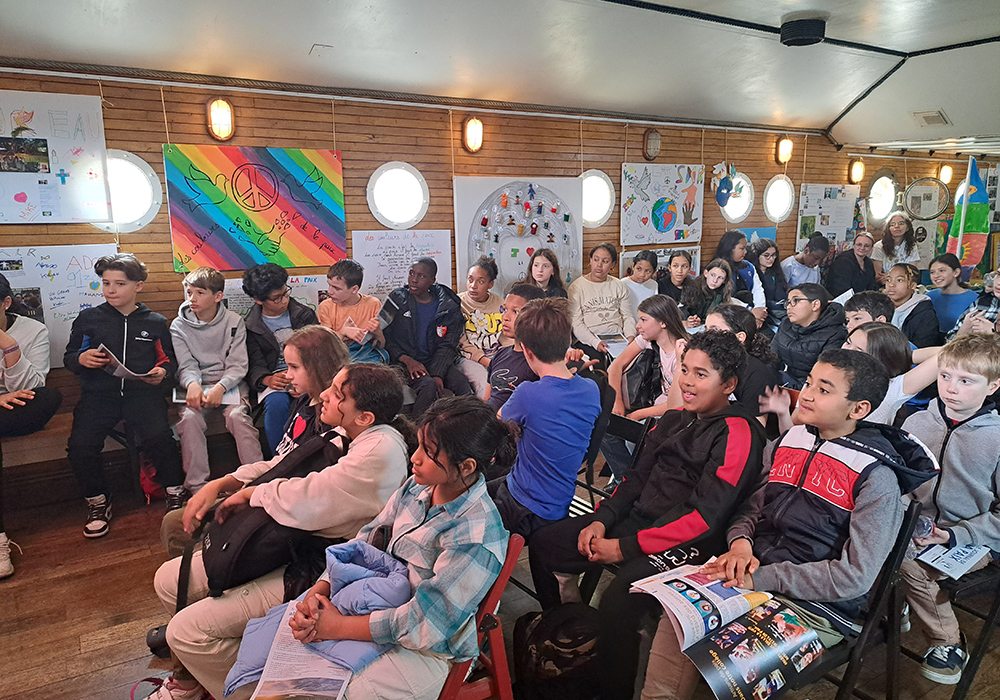
Youths gather for a lesson on peacemaking led by Pax Christi France in May 2023. (Courtesy of Pax Christi France)
Bérengère Savélieff, peace education officer for Pax Christi France for the past four years, said the young people she works with have never been more concerned about their future than they are right now.
The war in Ukraine and what it means to Europe, dimming prospects for jobs, and a rapidly changing climate top their lists of concerns. Threatened renewal of violence in Gaza and government upheavals in Europe and the United States also weigh heavily on their minds.
"They have a lot of stress and it's not really easy to have such an uncertain future," Savélieff told National Catholic Reporter just before the 80th anniversary of the Catholic peace organization in March. The start of Pax Christi France is also when organizers say the peace movement Pax Christi International began.
Savélieff said the pressing concerns on today's young people doesn't make it easy to teach about peacemaking but she is still seeing a gradually growing awareness among young people that they may be able to make a difference in everyday life.
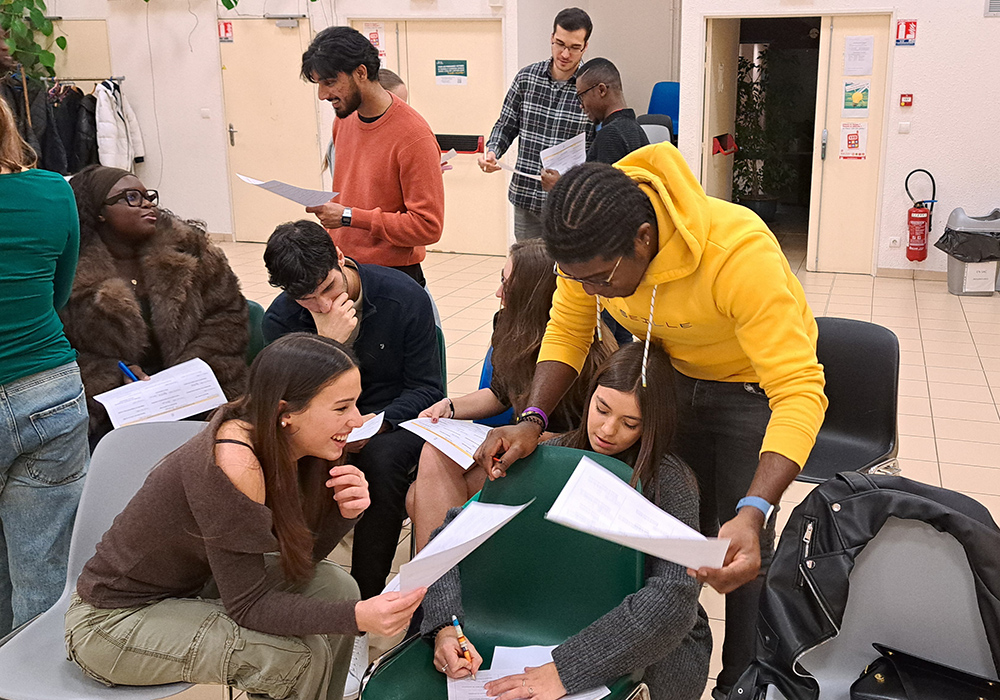
Young adults engage in an exercise focusing on the components of peacemaking in December 2024. (Courtesy of Pax Christi France)
"We are trying to give them some tools to understand what is peace culture," Savélieff explained.
"We cannot change things that we don't control, but we can start where we are, to have good values and to follow those values," she said.
The Pax Christi France leaders are taking similar approaches with adults, primarily at parishes with small group gatherings to read about peacemakers, studying Scripture and community discussions. Some parishes have a monthly Mass for peace that Pax Christi France helps organize.
"We're building a network and developing the confidence," Savélieff said.
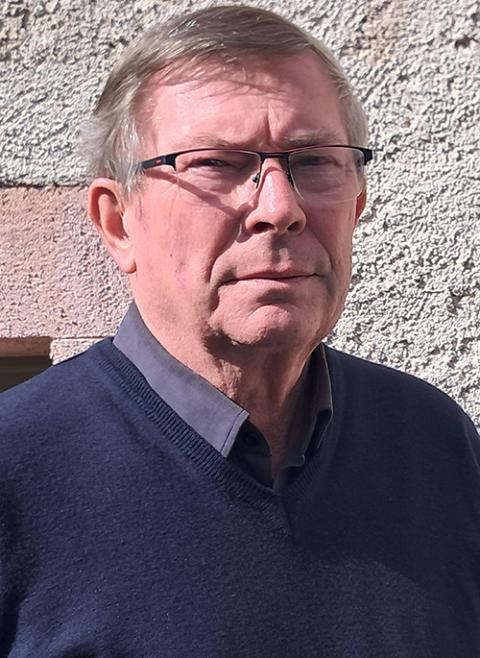
Hervé Dory, general delegate of Pax Christi France (Courtesy of Pax Christi France)
Partnering for peace
Pax Christi France, founded March 13, 1945, about six months before the end of World War II, works quietly and largely without much fanfare, despite its widespread presence throughout France. It often partners with ecumenical and interfaith groups in promoting its peace message.
The group's relationship with individual bishops and the French bishops' conference has remained strong over the past eight decades, said Alfonso Zardi, who completed his term as general delegate of the organization in January.
Hervé Dory, who became general delegate of Pax Christi France this year, said this relationship is nourished by peacemaking work in parishes and schools.
In an email to NCR, he said developing relationships locally and globally, especially with people living in conflict, can help build connections for people to see the need for peace and cooperation.
"An important challenge is to enable everyone to realize that they can be an agent of peace for themselves and others, both near and far," Dory said.
'An important challenge is to enable everyone to realize that they can be an agent of peace for themselves and others.'
—Hervé Dory, general delegate of Pax Christi France
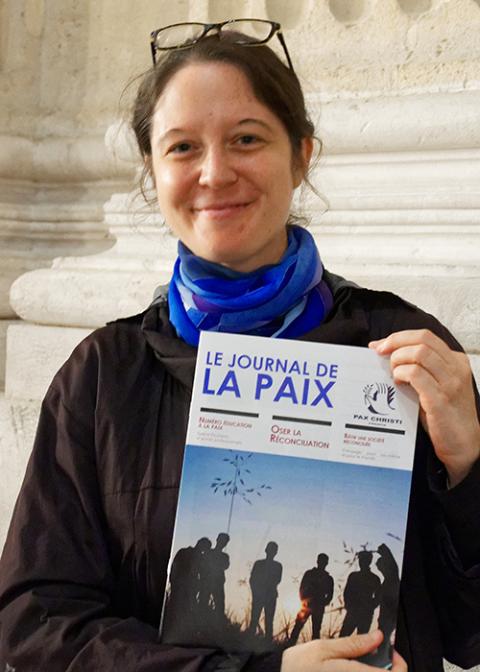
Bérengère Savélieff, peace education officer for Pax Christi France, holds a copy of the organization’s peace journal in September 2024. (Courtesy of Pax Christi France)
Savélieff said the organization's peacemaking efforts extend far beyond local initiatives, pointing out its partners in war-torn Ukraine, the Middle East, Democratic Republic of Congo and other African nations.
"The goal is to show that there's more to peacemaking than avoiding war," she said.
Reconciliation after war
This task of seeking reconciliation emerged from a group of Catholics who began praying together in Montauban in the south of France in late 1944. Nazi forces were in retreat; France was freed of occupying forces.
In their gatherings, they explored what their faith meant in the aftermath of immense violence. They thought about how Catholics in France and Germany, professing the same faith, had spent nearly 75 years in off-and-on conflict beginning with the Franco-Prussian War in 1870.
It was time for reconciliation, they realized.
Educator Marthe Dortel-Claudot was part of the group. She had opposed the Vichy government established in France after Nazi forces overran much of the country in 1940. Her opposition led her to aid Jews as well.
Advertisement
On March 11, 1945, she met with Bishop Pierre Marie Théas of Montauban to explain a movement built on prayer for peace and reconciliation. The bishop also had opposed the Vichy regime and spoke against Jewish deportation, leading to his imprisonment until after the D-Day landings in Normandy in June 1944.
Théas approved the peace movement followed a day later by Cardinal Jules-Géraud Saliège of Toulouse-Narbonne-Saint Bertrand de Comminges-Rieux. On March 13, Pax Christi was founded in Montauban "as a crusade of prayer for Germany," as it says on its website.
In 1952 Pax Christi International became an official international Catholic peace movement under Pope Pius XII, with headquarters in Brussels; today it has chapters in more than 55 countries.
Despite the diverse efforts to promote peace, Pax Christi France representatives and Pax Christi International's secretary general said political challenges such as the rise of the far right in Europe, the United States and elsewhere, threaten to upend the group's foundation of advocacy for peace and reconciliation.
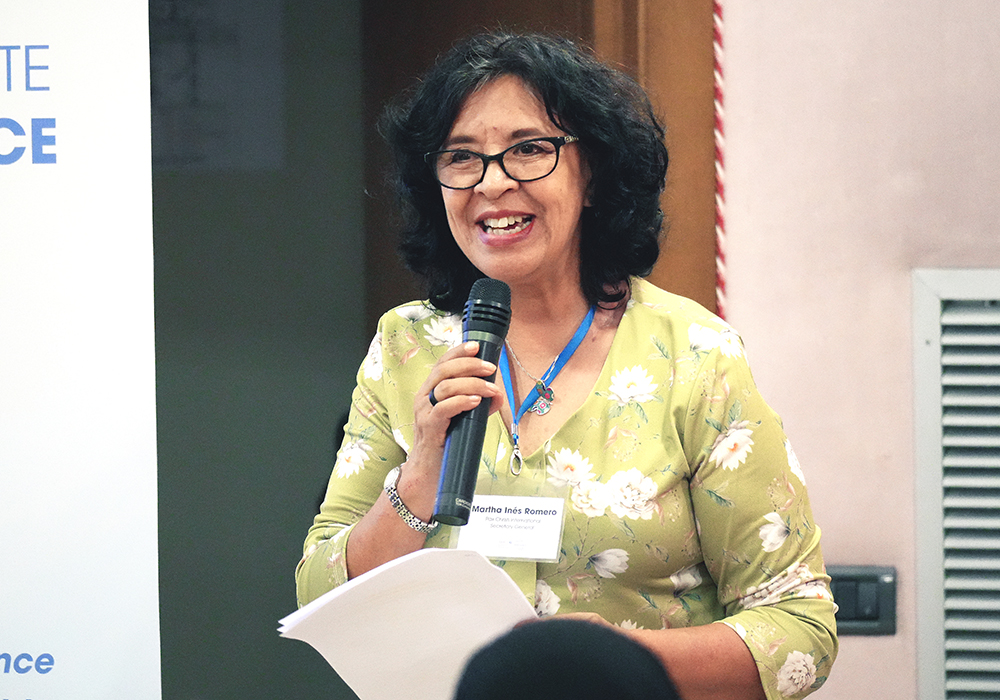
Martha Inez Romero, Pax Christi International secretary general, speaks at the introduction of the Catholic Institute for Nonviolence in Rome on Sept. 29, 2024. (Courtesy of Catholic Nonviolence Initiative)
These groups "show a big crisis in democracy, in diplomacy," Martha Inez Romero, Pax Christi International secretary general, said from Medellin, Colombia.
She said Pax Christi chapters focus on "building up from below," helping struggling communities in places like Gaza, Sudan and Myanmar understand they can become peacemakers at the most local of levels. "This is the way we are doing our work ... looking at those who are excluded," she said.
Anniversary events
Pax Christi leaders planned major events to mark the organization's founding. An ecumenical panel discussion about the importance of faith in promoting peace was followed by an interfaith prayer service at the Chapel for Europe in Brussels on March 13.
Pax Christi France is also planning a pilgrimage to our Lady of Lourdes July 18-20, the site of the first Pax Christi International Congress in 1948 which drew 10,000 participants from 26 countries.







